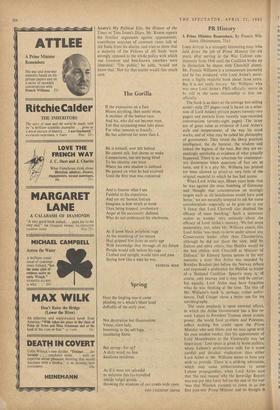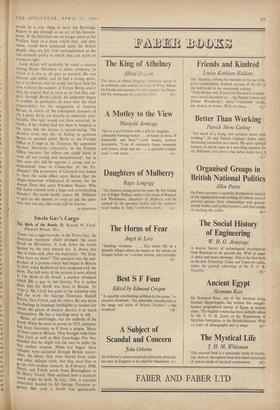PR History
A Prime Minister Remembers. By Francis Wil- liams. (Heinemann, 21s.) LORD ATTLEE is a strangely interesting man, who held down the job of Prime Minister for six years, after serving in the War Cabinet con- tinuously from 1940 until the Coalition broke up (a distinction he shares with Churchill alone). Mr. Francis Williams is a consummate journalist and he has produced, with Lord Attlee's assist- ance, a highly readable book about those years. But it is not really history: Mr. Williams who was once Lord Attlee's PRO officially. seems to be still in the same relationship to him un- officially.
The book is as short as the average best-selling novel—only 257 pages—and is based on a selec- tion of Lord Attlee's private papers (seventy-two pages) and extracts from recently tape-recorded conversations (seventy-eight pages). The latter are of great value as evidence of Lord Attlee's style and temperament, of the way his mind works, and of what may be called his philosophy of government. They reveal the sharp practical intelligence, the sly humour, the wisdom and indeed the bigness of the man. But they are ex- ceedingly unreliable as evidence of what actually happened. There is no substitute for contempor- ary documents when questions of fact are at issue, and it is a pity Mr. Williams has printed (or been allowed to print) so very little of the original material to which he has had access.
When Lord Attlee says, fifteen years later, that he was against the mass bombing of Germany and 'thought that concentration on strategic targets such as oil installations would have paid better,' we are naturally tempted to ask for some corroboration—especially as he goes on to say 'I fancy that Lord Cherwell also doubted the efficacy of mass bombing.' Such a statement makes us wonder very seriously about the efficacy of Lord Attlee's memory. We feel some uncertainty, too, when Mr. Williams asserts that Lord Attlee 'was ready to serve under almost any Conservative leader other than Chamberlain, although he did not share the view, held by Dalton and some others, that Halifax would be the best choice, with Churchill as Minister of Defence.' Sir Edward Spears qubtes in his war memoirs a story that Attlee was sounded by Brendan Bracken just before the Norway debate and expressed a preference for Halifax as leader of a National Coalition. Spears's story is. of course, only hearsay and it may well be untrue;
but equally, Lord Attlee may have forgotten what he was thinking at the time. The title of Mr. Williams's book is, perhaps, rather unfor- tunate. Duff Cooper chose a better one for his autobiography.
The main emphasis is upon external affairs, in which the Attlee Government has a fine re- cord. Letters to President Truman about atomic power, the world food problem and Palestine, reflect nothing but credit upon the Prime Minister who sent them; and we may agree with his own modest verdict that his appointment of Lord Mountbatten to the Viceroyalty was 'an inspiration.' Less space is given to home politics, where Labour's performance calls for a more careful and detailed vindication than either Lord Attlee or Mr. Williams seems to have any wish to provide. There is a striking admission, which may cause embarrassment to some Labour propagandists, when Lord Attlee says that 'the real reason' why the Beveridge Report was not put into force before the end of the war 'was that Winston planned to come in as the first post-war Prime Minister and he thought it would be a nice thing to have the Beveridge Report to put through as an act of his Govern- ment.' If the Socialists can no longer point to the Welfare State as a boon which they, and they alone, would have conferred upon the British people, they are left with nationalisation as the one domestic policy to which they can claim an exclusive right.
Lord Attlee will probably be rated a success among Prime Ministers—a select company, in which it is not at all easy to succeed. He was efficient and subtle, and he had a strong nerve; yet it is obvious that he could not have held his own without the support of Ernest Bevin, and it maybe argued that as soon as he lost that sup- port, through Bevin's death, his judgment began to wobble. In particular, he must bear the chief responsibility for the resignation of Aneurin Bevan, to which all the subsequent disasters of the Labour Party are directly or indirectly attri- butable. The split would not have occurred, he thinks, if he (Attlee) had not been in hospital at the time; but the excuse is unconvincing. The decisive error was his—in failing to promote Bevan to succeed either Bevin at the Foreign Office or Cripps at the Treasury. He appointed Herbert Morrison, reluctantly, to the Foreign Office, because 'the others one could think of were all too young and inexperienced'; but in that case why did he appoint a young and in- experienced man as Chancellor of the Ex- chequer? The promotion of Gaitskell was bound to have the same effect upon Bevan that the Anglo-American withdrawal of money for the Aswan Dam had upon President Nasser. Why did Attlee commit such a huge and reverberating blunder? We could hardly expect Mr. Williams to give us the answer, or even to ask the ques- tion, but one day the truth will be known.
AI TRINCHAM















































 Previous page
Previous page